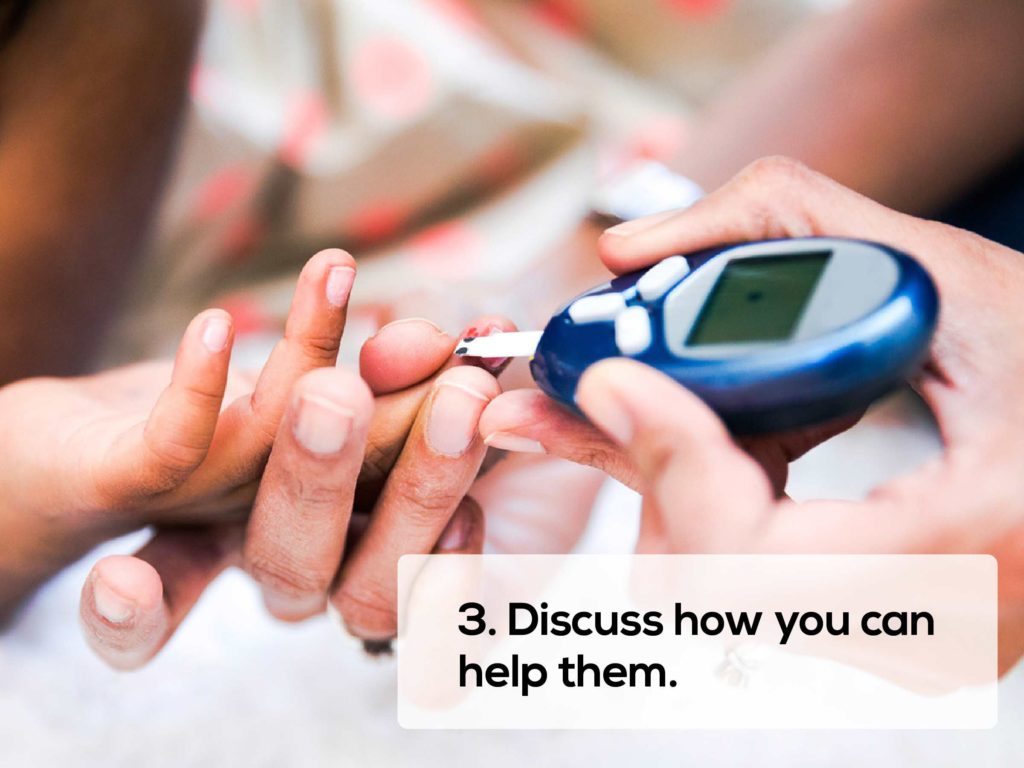A friend, your husband, your wife, or your parents have been recently diagnosed of prediabetes.
During the days following the diagnosis, you notice them acting differently from how they usually are. They become withdrawn. They get irritated easily. They blow up with the littlest of things. They struggle to follow what the doctor ordered.
Lifestyle change is important to reverse prediabetes. However, for the prediabetics, this is easier said than done. This is where you come in.
Here are a few things you can do to support your loved one:
1. Find out how they view their prediabetes.
When helping someone with a health condition, you have the find the sweet spot between being too overbearing and making them feel like you don’t care. Both of which would push them away from you.
The first thing you can do to help is find out their disposition towards prediabetes. Do they feel motivated or unmotivated? Accepting or overwhelmed?
This is crucial, because the ways you can help depend on how they view their own health condition.
If they are more accepting to their condition, they will be more open to ideas and advice. Help them where and when you can. But this doesn’t mean you should leave them to their own devices. Check in regularly and offer concrete help, because there will definitely be down times.
If they are unmotivated, you need more patience to help them. They will need more time and care to accept the diagnosis and move on with their lives. More on this on the next point.
2. Listen before you talk.
When your loved one is unmotivated, most of the time, they only need to feel that there is someone willing to listen to them. You don’t even need to offer advice. Let them rant. Let them cry.
Allow them to take their time in accepting their condition. Maybe they are the kind of people who need catharsis before they take action. Maybe they need to be able to have a good night’s rest first, and then tackle the problem head on in the morning.
When they are more receptive to outside input, you can then start talking about their diagnosis.
Instead of giving them platitudes (e.g. “this too shall pass”), ask something more concrete. Questions like “what do you fear happening?” or “what are you worried of?” or “which of the doctor’s orders are you struggling with?” would help more.
3. Discuss how you can help them.
 Feeling alone is one of the worst emotions, especially for those with prediabetes. Make them feel that you genuinely care and that your offers for help are not just lip service.
Feeling alone is one of the worst emotions, especially for those with prediabetes. Make them feel that you genuinely care and that your offers for help are not just lip service.
There are a couple of things you can do:
- Ask them how you can help in specific ways. Saying something like “Let me know, if you need help” is comforting; but coming up with concrete ways to help is better. For example, go with them when they go grocery shopping. You can help read the back labels and watch out for sugar content. You can also help track their meals, give them a ride to the doctor, or enroll in an exercise program together.
- Educate yourself as well. You would know more ways to help if you educate yourself about prediabetes. Read up and know the facts. Patients tend to listen more to their loved ones than doctors, so make sure you are armed with science-backed advice.
4. Motivate them with rewards, rather than consequences.
Rewards are based on positive feelings. These are more encouraging, instead of telling them the dire consequences of not changing their lifestyle. They most likely already know the worst-case scenario.
Instead, let them know what they will get out of all their hard work. How about all the food they can eat again once their glucose levels return to normal? A bikini-ready body once they’ve lost weight? Being able to live long enough to watch their children grow up, have their first dates, or walk them down the aisle?
Find out what they love to do and base your motivations on those positive feelings. However, be careful not to be too overbearing, as that would backfire and push them away from you.
5. Take care of yourself too.
Lastly, you won’t be of any help if you don’t take care of yourself as well. Feeling burnt out and stressed, especially when you are living with a prediabetic, is normal. You can look up support groups for caregivers like yourself or talk to anyone who you know is going through the same thing. It helps to meet people who know exactly how you are feeling.
By their side
Bear in mind that this diagnosis may come as a shock for them. Changes are not always easy, especially when they have to completely change the lifestyle they’ve been following their entire lives. The most drastic will be the need for a more active lifestyle and to significantly cut back on their sugar and carbs. They might even start taking dietary supplements for diabetes just to lower their blood sugar.
Just assure them that no matter what, you’ll always be by their side.








